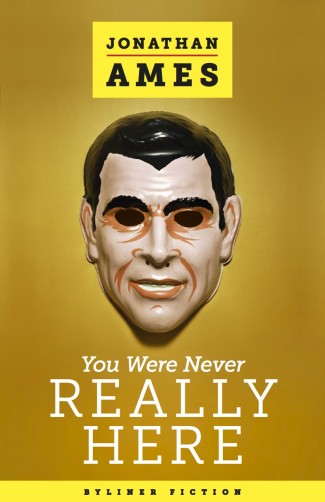INTERVIEW: Jonathan Ames on his new Westlake-inspired short story

Jonathan Ames, author of I Pass Like Night and creator of HBO’s recent Bored to Death series, has gone the route of Richard Stark (pseudonym for Donald Westlake) by creating a thriller featuring pithy sentences, a complicated hero, plenty of villains and enough darkness to spread all around New York City.
Byliner, an online media company specializing in digital books, recently released Ames’ You Were Never Really Here, a short story that features a protagonist by the simple name of Joe. He’s a man who saves young women from human trafficking. He’s ex-FBI, suicidal and grouchy. His weapon of choice: a hammer, perhaps the most personal means of expulsion available to a character in a mystery novel.
For readers, it’s a departure from Ames’ usual fare, which includes the novels The Best Man and Wake Up, Sir! It feels more like Raymond Chandler with a touch of Graham Greene, a quick tale in a complex world.
“I was reading and rereading the entire oeuvre, as it were, of Richard Stark, which is a pseudonym for Donald Westlake,” Ames said recently during a phone interview. “And I was just very enamored of his incredible quick-paced, lean style.”
You Were Really Never Here grew out of the appreciation for Stark’s Parker series, and Ames fully admits to the literary inspiration. “Whenever I’ve written fiction, I’m usually … mimicking someone or have been inspired by the sound of someone’s prose,” he said. “So this was my kind of response to Parker.”
Running less than 50 pages, the short story can be experienced in one sitting. Joe, the subject of the story, is a man of few words, although Ames writes detailed descriptions of the character’s poor allotment in life. He lives with his mother in Queens and prefers a lifestyle that’s largely hidden from society. Security cameras make him uneasy and personal connections with neighbors and friends are largely nonexistent.
For Ames, a vision of a man in an alleyway was what sparked the entire idea for the short story. “I don’t know where things come from when you create them,” he said. “It was a technique of Stark to always begin in the midst of some other … scene besides the main story for the protagonist. So again with this guy, who I knew was a good guy — Parker is a criminal — getting jumped, and then suddenly I had this idea that his weapon would be a hammer. I don’t know why. So definitely it began with the character, and then quickly after the character, the idea that his main job was to free young girls who had been abducted, and then the plot slowly came to me bit by bit.”
Why the hammer? “It seemed sort of mythic in a way,” Ames said.
The cynicism of the story — including dirty politicians, a hidden bordello near the United Nations — is almost like a literary device to better define the main character’s journey. “It’s definitely a lugubrious world,” Ames said. “Joe maybe can transcend this somehow and redeem himself. … I guess the pleasure for me was trying to write tight, quick sentences, you know. And I would like as the novel progresses for beauty to crack the surface.”
Ames’ relationship with Byliner is new ground for the writer, who has spent the last three years running the critically-acclaimed HBO series Bored to Death. “I had it in mind to try to write a long short story, and it was very much a new form for me,” he said. “I hadn’t written much in the third person. I’ve really only written one previous thriller, which was a short story that I then turned into a TV show, Bored to Death. So, yeah, it started off as a short story, but now after I finished it, I was just like, ‘I think this is the opening chapter to a novel.’ And so I see it that way now.”
Having an electronic-only version of the story is also new. The author acknowledges the “transition” of the publishing industry, but hopes the printed page will continue to exist. “I think what’s kind of great about this is that it can start off electronic and then it doesn’t prohibit me from then publishing it as a print book,” he said. “I tend to be a bit technologically phobic, you know. So I’m not very savvy with all these new gadgets myself, but I know a lot of people enjoy reading this way, which is cool, as long as people are reading. I mean personally, of course, I don’t want to see printed page go away. I tend to form — oddly, just because of conditioning — a connection with physical books. You know they pile up by my bed, or there’s an edition that I’ve read and reread. And I don’t know if quite the same thing will happen with electronic matter.”
Ames almost jokes at having “one foot in the past,” what with his apartment filled with books. “It’s who I am,” he said.
The future for the author includes a number of projects. Perhaps his most high profile is a recent commission by HBO for a Bored to Death TV movie. It’s in the very early stages, but Ames has begun work on the script. The project will be a reentry into a world he knew well for three years. “I was the showrunner,” Ames said matter-of-factly. “I wrote or co-wrote every episode. I had the final edit on every episode. I was on set for 90 percent of all takes, unless if I had to be in a costume meeting or attend an audition or be in the editing room. So I was deeply involved.”
Overall, he said the work made him happy, and he enjoyed the chance to give “some joy to viewers.”
“No work of art is perfect,” he added. “The people I worked with were wonderful. Overall, it was quite a great experience.”
Besides Bored to Death, it appears Ames will stick with Joe for a while longer and extend You Were Never Really Here into full-length form. “I have an idea of where I want the novel to go, so (Joe’s) kind of like somewhat frozen in time,” he said. “I don’t want to let him go too long, because then maybe I’ll lose him. But yeah he’s still with me, though kind of in a little bit on a Walt Disney suspended animation freeze somewhere in my psyche.”
Joe joins a growing line of protagonists who all frequented their creator’s mind at one point or another. “I’ve had the experience of other novels I’ve written where I’m living with the narrator, or I’m living with the protagonist quite deeply in my mind,” Ames said. “When I finish the book, it’s like, ‘Oh, I’m not going to be with that person anymore.’ Or, ‘I won’t be putting on these odd glasses to see the world the way they do anymore.’ And there’s a moment of feeling somewhat bereft and then sometimes feeling relieved. And then when I finished my first novel, which was called I Pass Like Night, it was a rather dark book, it was kind of a relief not to be in that guy’s head anymore. At the same time, he had become something of a friend, so I was going to miss him.”
By John Soltes / Publisher / John@HollywoodSoapbox.com
-
Click here for more information.

